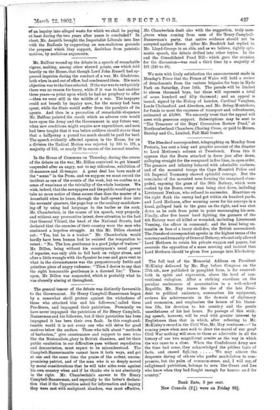In the House of Commons on Thursday, during the course
of the debate on the war, Mr. Dillon contrived to get himself suspended after an angry, not to say ridiculous, exhibition of ill-manners and ill-temper. A great deal has been made of the " scene" in the Press, and we suppose we must record the incident as one of the events of the week, but we confess to a sense of weariness at the triviality of the whole business. We wish, indeed, that the newspapers and the public would agres to take no more notice of these scenes than does the master of a household when he hears, through the half-opened door into the servants' quarters, the page-boy or the scullery-maid show- ing off by using bad language to the butler or the cook. Mr. Chamberlain, in the course of his speech, very properly, and without any provocative intent, drew attention to the fact that General Vilonel, the head of the National Scouts, had declared that the enemies of their country were the men who continued a hopeless struggle. At this Mr: Dillon shouted out : "Yes, but he is a traitor." Mr. Chamberlain would hardly have been human had he resisted the temptation to retort : " No. The hon. gentleman is a good judge of traitors." Mr. Dillon, being without his countrymen's usual power of repartee, was only able to fall back on vulgar abuse, and after a little wrangle with the Speaker he rose and gave vent to what in the circumstances was the preposterously feeble and pointless piece of angry rudeness: "Then I desire to say that the right honourable gentleman is a damned liar." There- upon, Mr. Dillon was suspended, which is probably what he was clumsily aiming at throughout.










































 Previous page
Previous page